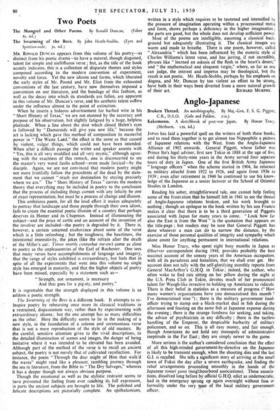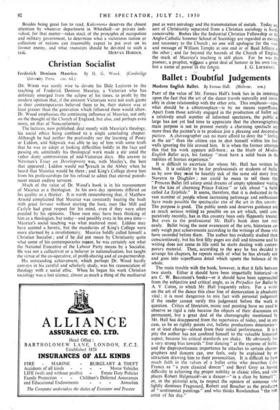Anglo-Japanese
Broken Thread. An autobiography. By Maj.-Gen. F. S. G. Piggott, C.B., D.S.O. (Gale and Polden. 2 Is.) Kakemono. A sketchbook of post-war Japan. By Honor Tracy. (Methuen. 12s. 6d.) JAPAN has laid a powerful spell on the writers of both these books, and to read them together is to get almost too Nippophile a picture of Japanese relations with the West, from the Anglo-Japanese Alliance of 1902 onwards. General Piggott, whose father was Prince Ito's legal adviser, first saw Tokio in 1888 at the age of five, and during his thirty-nine years in the Army served four separate tours of duty in Japan. One of the first British Army Japanese " language officers " when the scheme started in 1904, he returned as military attaché from 1922 to 1926, and again from 1936 to 1939 ; even after retirement in 1940 he continued to use his know- ledge of the Japanese as a senior lecturer at the School of Oriental Studies in London.
Reading his sober, straightforward tale, one cannot help feeling some of the frustration that he himself felt in 1941 to see the thread of Anglo-Japanese relations broken, and his work brought to nothing ; though an epilogue to the book written by his son Francis makes it clear that there is to be a third generation of Piggotts associated with Japan for many years to come. " Look how far also the East is from the West " is the quotation that appears on the title-page ; but readers may be sure that General Piggott has done whatever a man can do to narrow the distance, by the exercise of those personal qualities of integrity and sympathy which alone count for anything permanent in international relations.
Miss Honor Tracy, who spent eight busy months in Japan as Observer correspondent during 1948, provides probably the best succinct account of the uneasy years of the American occupation, with all its paradoxes and banalities, that we shall ever get. Her account does not tally with the self-glorifying monthly reports from General MacArthur's G.H.Q. in Tokio ; indeed, the author, who often woke to find rats sitting on her pillow during the night at the U.S. Press Club in Tokio, devotes much of her pronounced talent for Waugh-like invective to holding up Americans to ridicule. There is their belief in statistics as a measure of progress (" How many women's organisations have you democratised this month ? I've democratised nine ") ; there is the military government' food- officer trying to stamp out a black-market deal in fish during the afternoon and feasting on the same fish at Japanese expense during the evening ; there is the strange fondness for seeking, and taking, the advice of psychiatrists in any difficulty ; there is the tactless handling of the Emperor, the despicable barbarity of military policemen, and so on. This is all easy money, and fair enough, though Americans do not hold any monopoly of administrative ineptitude in the Far East ; they are simply newer to the game.
More serious is the author's considered conclusion that the effect of all this high-minded goVernment-by-directive on the Japanese is likely to be transient enough, when the shouting dies and the last G.I. is recalled. She tells a significant story of arriving at the small town of Fukui the day after a severe earthquake, and finding the relief arrangements proceeding smoothly in the hands of the Japanese tonari guini (neighbourhood associations). These associa- tions, dissolved long before by official G.H.Q. edict as undemocratic, had in the emergency sprung up again overnight without fuss or formality under the very nose of the local military government officer. Besides being great fun to read, Kakemono deserves the closest attention by whatever department in Whitehall—or private indi- vidual, for that matter—takes stock of the principles of occupation and military government, to determine what a victorious nation or collection of nations can reasonably expect to put over on its former enemy, and what resources should be devoted to such a



































 Previous page
Previous page